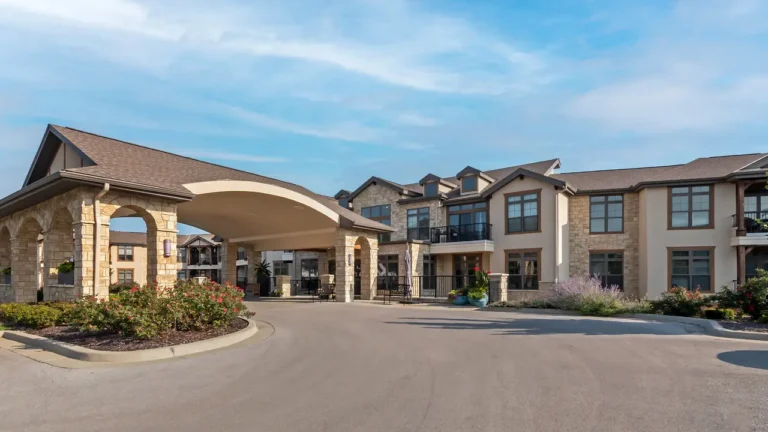When navigating through health decisions with your senior loved ones, there comes a time when you need to consider a higher level of care for them, including the transition to long-term care communities. This is the time that senior care plans and aged care planning comes into the picture.
What Is Long-Term Care?
Long-term care for seniors refers to services and support designed to meet the medical, personal and social needs of seniors who may require assistance with daily activities and cannot fully care for themselves.
Long-term care is often provided over an extended period and works to maintain or improve the quality of life and ensure the safety and well-being of seniors as they age. These health care choices can be difficult but can also bring peace of mind as you develop your senior care plan.
Long-term care planning can be a daunting task, but Tutera Senior Living & Health Care serves as a dependable resource for senior care knowledge. You can count on Tutera’s tailored care services to provide support and guidance throughout aged care planning, whether it’s for you or a cherished family member.
Here are five ways to prepare your family for a senior’s transition into long-term care:
5 Tips for Long-Term Care Planning
- Begin long-term care planning sooner rather than later.
The first challenge during this time in senior care planning is to have a conversation with your loved one about the need or desire for long-term care outside of the home. While many seniors are open to the idea of a maintenance-free lifestyle, many are not ready for the change. At this time, initiating the conversation is a great way to start the planning process. Maintain that this is a joint effort and process as you create a senior care plan.
Financing long-term care can be a significant concern, as it can be costly, and various options, including private insurance, Medicaid and Medicare, may be considered based on the individual’s circumstances. Planning for long-term care is an important aspect of financial and health care planning for seniors and their families.
While you may not need to enlist long-term care right away, it’s always a good idea to understand specifics like your budget, desired location and level of care and to visit senior living communities to find a potential new home. When you start the planning process early, you have more time to consider all options and make informed decisions wisely.
Begin to collect important information, bills and names of doctors/medications and keep in a safe spot for recordkeeping. You will need these documents going forward, so it’s a perfect time to put them all together. To make this easy, keep a folder or digital document with important information, contacts and resources so you can access it easily when needed.
Many long-term care strategies will come into account here, so it’s important to choose the ones that are right for you and your family. - Assess individual needs.
Evaluate the specific needs and preferences of your loved ones to determine the scope of need for long-term care. When doing this, take into account factors such as their health, mobility and any special requirements. These questions will help you narrow your search to only senior living communities that fit your needs. Ask yourself the following questions:
Does my loved one need help with activities of daily living, such as housekeeping, bathing and dressing?
Is their current home accessible and safe for their needs? Do they need a higher level of accessibility in their new home?
Does my loved one have a dementia diagnosis or require memory care services?
There are several different types of senior care plans, including:
Independent living: Residents do not require any assistance in the home but could use a carefree way of living – with built-in activities, amenities, neighbors and services like housekeeping.
Assisted living: Residents require assistance with activities of daily living, such as eating, bathing or dressing, from a caregiver.
Memory care: Residents with cognitive impairment need the extra safety and security of close monitoring and caregiving support.
Long-term care strategies include evaluating different types of care needed that depend on an individual’s health, preference and the available resources. - Develop a support network.
When creating a senior care plan, it is important to start collecting your loved one’s medical information and health assessments and keep them in a safe place. While you are collecting information, start building relationships with your loved one’s doctors and other resources they interact with on a regular basis.
Involve other family members in planning and decision-making to ensure that you are taking all factors into account and choosing the best long-term care community for your loved one. Long-term care planning can be a joint effort for all members of the family and support network.
Rely on trusted professionals to help you decipher signs, symptoms and other indicators that it is time to move into long-term care. In some instances, it may take a professional like a doctor or nurse to help convince your family member that this is the right decision. Doctors can offer guidance on available resources and recommendations for your loved one’s specific needs.
Ordering a health assessment or needs assessment by a trusted doctor is a great way to begin to start planning for seniors. They can act as your long-term care advisor as you work your way through these decisions.
Reach out to the senior care community – use websites, forums and social media groups dedicated to senior health and caregiving. Websites like AgingCare.com, AARP and the Alzheimer’s Association offer valuable information and support. - Research care communities.
If you are considering long-term care communities, take the time to research and visit a variety of senior care options to find the best fit for your loved one. Factors such as location, amenities, activities and team member interactions can influence your decision when choosing a senior care community.
Look for online reviews of the community and see if they are overwhelmingly positive or negative. On every review site, there will be a few naysayers – but see if it seems like the situations are just an exception to the rule of otherwise good care.
When visiting a senior living community, observe the environment and ask the following questions:
What is the atmosphere like? Does it look and smell clean and well maintained?
Are the team members friendly and helpful?
How does the team interact with the residents?
Do residents appear happy, alert and engaged?
Ask the leadership: How are the team members screened and trained?
What are the activities like? Sit in on one of the daily activities and see what they have to offer on a daily basis.
Is there a process for reporting and addressing safety concerns?
Remember to take notes during your visits, ask for brochures and information packets, and observe the overall atmosphere and interactions between staff and residents. Visiting multiple communities, asking these questions and conducting thorough observations will help you make an informed decision about the best fit for your loved one’s needs and preferences. - Stay informed.
Research and help your loved one apply for government benefits like Medicare, Medicaid or Social Security, which can provide financial assistance for health care and other needs.
Seniors and their families may also benefit from consulting with legal and financial advisors for long-term care planning and navigating available benefits. At this point, it makes sense to button up any outstanding issues, such as electing a power of attorney in case they are unable to make medical decisions on their own.
Visit government websites, like the U.S. Administration on Aging (AoA) or the equivalent agency in your country. These websites often provide information on senior programs and services.
Further, many communities have directories or online databases of local services and resources for seniors. Check with your local government or libraries for access. Utilizing these long-term care advisors will be beneficial as you decide your next steps.
While the journey to selecting long-term care for your loved one can be arduous, take these notes into account as you begin to imagine and curate the life that you want for your loved one. Once the selection and move-in process is over, you can enjoy peace of mind that your family member is well-taken care of, safe and comfortable.
Long-Term Care at Tutera
Tutera communities weave compassionate care into every part of daily life in long-term care. With trained caregivers, access to activities and amenities, spacious homes and more, these senior communities breathe new life into residents’ lives in a carefree and maintenance-free environment.
The team members at each community are thoroughly trained to handle any situation that arises, ensuring safe, secure and comfortable care for every resident. Further, those team members involved in memory care activities and care have specialized care training to help navigate situations in senior dementia care.
With restaurant-style dining, housekeeping and laundry services, and access to transportation to get seniors where they need to go, Tutera communities create enriching and engaging experiences for residents in their care.
Tutera is here to help you navigate this transition, and our dedicated team members would love to speak with you about your long-term care options. Click here to learn more by finding a community near you.







